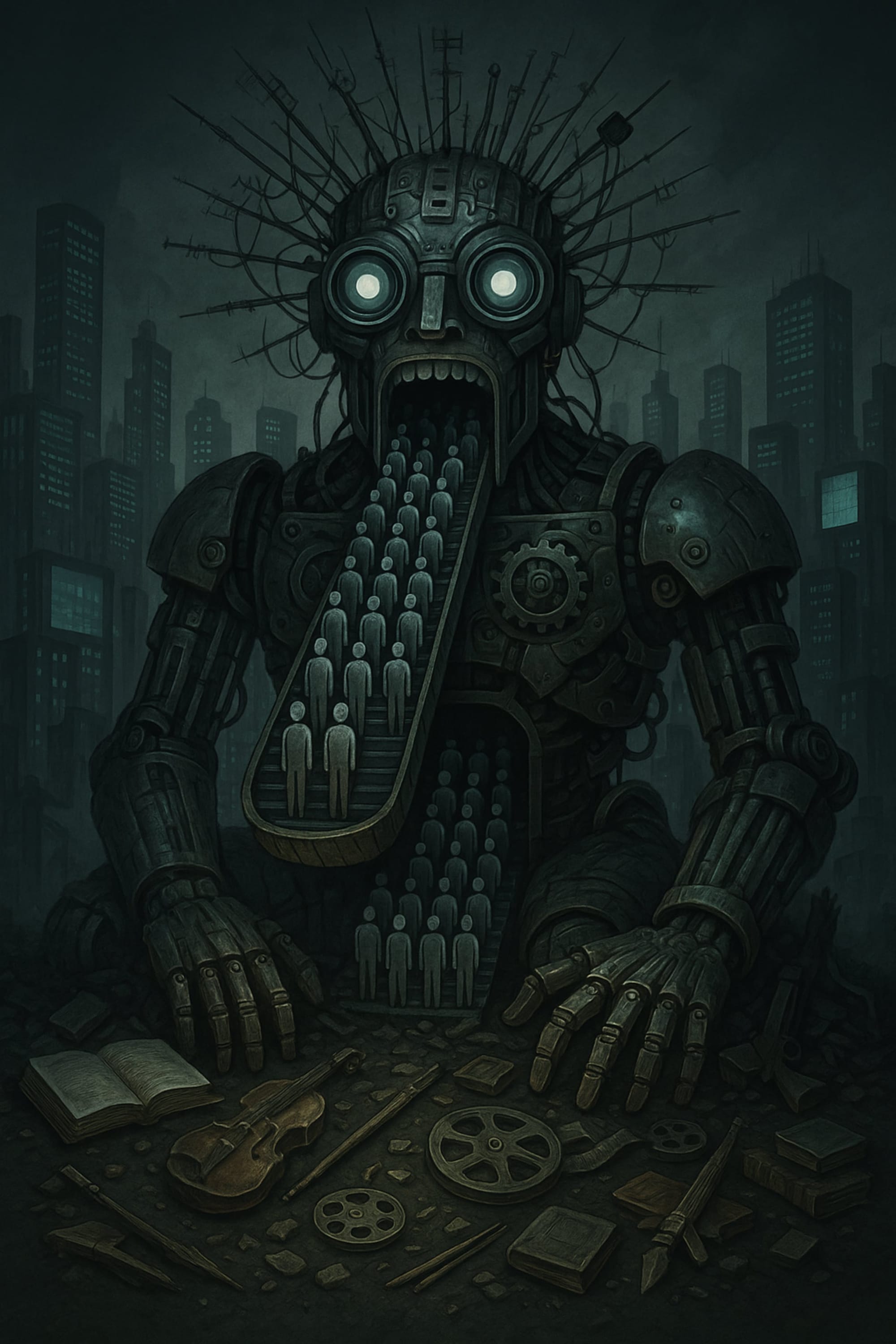The Mind in the Machine: Language Models and the New Moloch

In 1956, Allen Ginsberg wrote "Howl," a visceral critique of a society that reduced individuals to mere cogs in the machinery of capitalism and conformity. Ginsberg symbolized this destructive force as "Moloch," an entity consuming human creativity, authenticity, and spirit [1]. Today, as artificial intelligence—especially large language models (LLMs)—advances, we find ourselves confronting a new digital incarnation of Moloch, where the potential for human dehumanization is not only amplified, but systematized at scale.
While early critiques of AI focused on recommendation engines and algorithmic feeds, the rise of LLMs introduces a deeper structural risk: the simulation and commodification of language, thought, and expertise itself. LLMs such as GPT-4, Claude, and others are increasingly embedded in content creation, customer service, education, therapy, and software development. This ubiquity risks outsourcing not just labor, but cognitive and emotional labor—undermining the value of human nuance, struggle, and original expression [2].
LLMs are trained on vast amounts of human-generated text, but they produce language divorced from lived experience. As these models are adopted en masse, there is a risk of flattening cultural discourse into plausible yet derivative outputs. Platforms flooded with AI-generated content may drown out authentic voices, reinforcing Ginsberg’s fear of mechanized minds. Aesthetic originality, critical dissent, and nonconforming ideas could become statistical anomalies—filtered out by optimization algorithms prioritizing coherence, civility, and engagement metrics [3].
Moreover, the integration of LLMs into professional workflows risks creating environments where human workers serve primarily as curators or validators of machine output, rather than as original thinkers. This dynamic mirrors the reduction of human beings to extensions of technical systems—a central concern in "Howl"—where creativity becomes a supervisory function rather than an originating force [4].
The existential risk is not just technological displacement but cultural erosion. As LLMs become conversational agents, writing assistants, and even companions, they subtly reshape our social and psychological norms. What does it mean to think deeply, to struggle with ambiguity, or to write badly and then improve, when the machine can simulate perfection instantly? If language becomes frictionless, we risk losing the very tensions and imperfections that make communication human [5].
The "digital Moloch" no longer needs skyscrapers or factories—it resides in cloud infrastructure, model weights, and inference APIs. It monetizes cognition, streamlines empathy, and generates a synthetic mirror of our collective output. Left unchecked, it may turn the most sacred aspects of consciousness—our doubts, contradictions, and dreams—into predictable, monetizable tokens.
Yet, awareness of this trajectory allows us to resist. The solution is not to reject LLMs but to use them consciously. We must promote frameworks for ethical co-creation, preserve the space for human idiosyncrasy in public discourse, and build infrastructures that privilege provenance, context, and intent over scale and efficiency [6]. We must teach the next generation to recognize the difference between generated fluency and earned insight.
Like Ginsberg’s generation, we stand at a crossroads. Let us choose wisely, ensuring that AI—and especially the language engines shaping our futures—uplifts human creativity and individuality, rather than sacrificing these essential qualities on the altar of algorithmic elegance.
References:
[1] Ginsberg, Allen. Howl and Other Poems. City Lights Books, 1956.
[2] Crawford, Kate. Atlas of AI: Power, Politics, and the Planetary Costs of Artificial Intelligence. Yale University Press, 2021.
[3] Bender, Emily M., et al. "On the Dangers of Stochastic Parrots: Can Language Models Be Too Big?" Proceedings of the 2021 ACM Conference on Fairness, Accountability, and Transparency.
[4] Susskind, Daniel. A World Without Work: Technology, Automation, and How We Should Respond. Metropolitan Books, 2020.
[5] Morozov, Evgeny. "The Revolution Will Not Be Automated." The New Republic, 2023.
[6] Mozilla Foundation. Building Trustworthy AI: A Guiding Framework. 2020.
